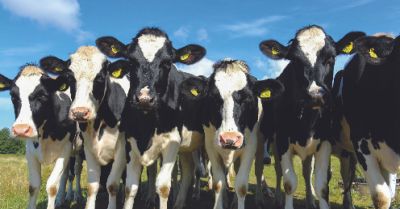
Posted By:
2023 is working out to be another hard year to manage with grazing and feeding dairy cattle.
2022 had a record high of 40.3 C, breaking a previous record that lasted 3 years. In comparison the 1911 record of 36.7 C stood for 79 years.
Higher yielding cows also generate more heat from greater metabolic activity which increases the risk of heat stress. A cow producing 18 litres generates 28% more body heat than a dry cow and a cow yielding 31 litres a day produces 48% more heat than a dry cow. Research has shown that with an increase in milk yield from 35 to 45 litres the heat stress temperature threshold may be reduced by 5 C.
Heat stress affects production, reproduction, nutrition, health and welfare. Heat stressed cows have been found to have a 23% reduction in conception rate. I.e. a herd with a 40% cnception rate would drop to 30.8%
In the United States cows spend 14% of all annual hours in heat stress conditions. The UK does not get the same extreme heat of other dairy producing countries have but we can have high relative humidity. The effects of this can be seen below:
Signs of heat stress
- Cows lethargic and moving round slowly
- Increased respiratory rate
- Reduced intakes and milk yield
- Cows bunching together
Practical management of heat stress
- In hot weather cows may drink up to 20% more, so it is essential that high traffic areas are well supplied with clean fresh water. Access at grazing is important as cows with heat stress will be more lethargic and less keen to walk further for water.
- Increasing air flow has a dramatic effect on evaporative heat loss from the skin. Some USA research shows that airflows of 10 km/hr which is classified as a light breeze can reduce respiratory rates in heat stressed animals by 50%.
- Natural ventilation may be improved by ensuring the sheds have sufficient ridge outlets for the stocking density and size of cattle in the shed.
- Requirements can be calculated exactly to account for roof pitch etc but as a rule adult cattle require approximate outlets of 0.1m2 each.
- Inlets can be calculated and should be a minimum of twice the outlet area. A 10cm space board with a 2.5cm gap gives a 20% inlet (12.5cm/2.5cm).
- Mechanical ventilation can also be installed.
- Cows can be cooled with water; care needs to be taken regarding bedding and mastitis risk. The collecting yard may be an area to look at for this.
- Roof lights can allow excessive heating, on some sheds roof lights could be removed, painted over or minimised on South facing aspects.
The picture below shows an on-farm adaption to raise the roof ridge. The farmer needed to keep the area below dry to house a robot. Other ridges on the farm have been left open.
.jpg)
- Vet Rob Powell
Partnering with Shepton Vets for Optimal Dairy Herd Management
At Shepton Vets, we are dedicated to supporting dairy farmers in maximizing the health and productivity of their herds, even during challenging weather conditions. With rising temperatures and the potential impact of heat stress on cattle, it becomes crucial to implement effective management strategies. By incorporating our recommendations for hydration, shelter, nutrition, cooling methods, heat stress monitoring, and veterinary consultations, you can mitigate the risks associated with hot weather.
Our experienced team is here to provide expert guidance, customised solutions, and ongoing support tailored to your specific farm setup. Whether you need assistance in optimising nutrition plans, evaluating ventilation systems, or implementing innovative cooling methods, we are committed to partnering with you every step of the way.
Remember, the well-being and comfort of your dairy cattle are paramount to their overall health and productivity. By prioritising their needsand implementing proactive measures you can ensure that your herd remains resilient and thrives even in the face of challenging weather conditions.
Trust Shepton Farm Vets to be your reliable partner in optimal dairy herd management. Contact us today to schedule a consultation and take the necessary steps to safeguard your herd's well-being. Together, we can navigate the challenges of hot weather and nurture a thriving and successful dairy operation.
Whilst on my visits I have been having several discussions...
As our feline friends get older there are a few conditions...
Another winter discussion group season is now behind...
©2024 Shepton Veterinary Group Ltd., All rights reserved.
Privacy Policy • Terms & Conditions • Cookie Policy